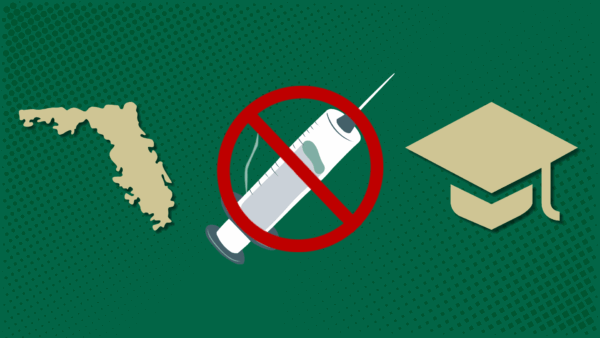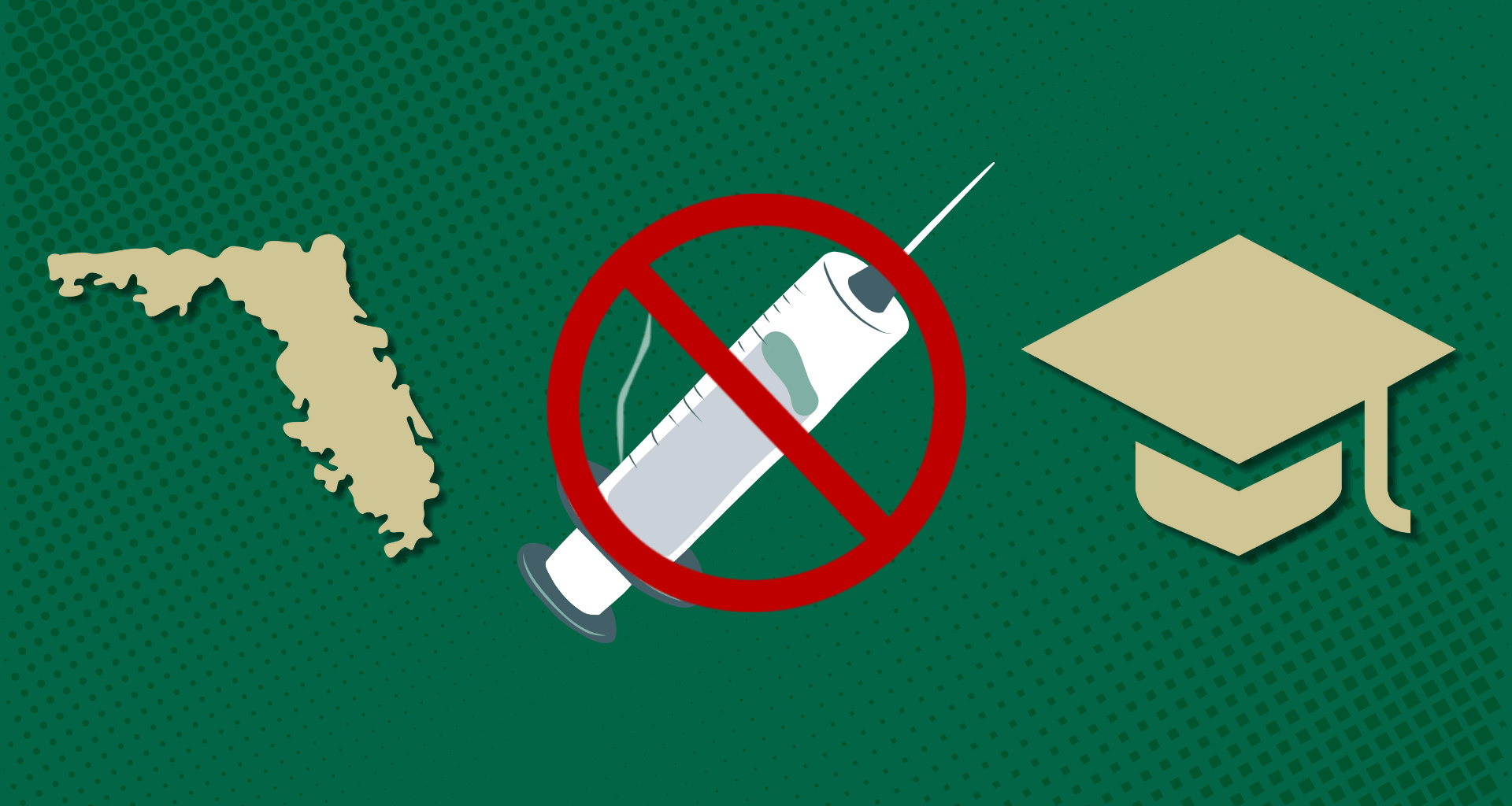 USF officials say the university is monitoring Florida’s plan to make school vaccine mandates voluntary. ORACLE GRAPHIC/MAIA HENNAWY
USF officials say the university is monitoring Florida’s plan to make school vaccine mandates voluntary. ORACLE GRAPHIC/MAIA HENNAWY
A Florida Department of Health plan to eliminate vaccine mandates in K–12 schools could extend to universities — and USF is analyzing whether the change could affect its student immunization requirements.
Florida State Surgeon General Dr. Joseph Ladapo initiated the change in September to make immunizations voluntary — including for hepatitis B, chickenpox, Haemophilus influenzae type B and pneumococcal diseases.
The change is expected to take effect after a 90-day review period and would make Florida the first state to remove mandatory vaccination requirements as early as December, according to the Associated Press.
Although it’s still unclear if the change would affect colleges, some USF faculty and students said removing vaccine requirements could put the campus community at greater risk for preventable diseases.
Related: USF reopens on-campus primary care clinic for faculty and staff
USF’s immunization policy requires students to provide proof of immunity against measles and rubella, along with evidence or a signed waiver for hepatitis B and meningitis vaccines, according to the Student Health and Wellness Center.
Students living on campus may lose housing privileges if they fail to comply, and those without proper documentation can be blocked from class registration.
Religious and medical exemptions for immunization requirements are available, but must be approved by the Student Health and Wellness Center.
USF spokesperson Althea Johnson said there are currently no changes to the existing policy, which was last reviewed in January.
Still, Joseph Puccio, the executive and medical director of the Student Health and Wellness Center, said USF is keeping a close watch on state-level changes.
This includes keeping up to date on potential updates to Florida Board of Governors regulations and university health compliance procedures that could follow DOH’s changes, Puccio said.
“USF currently has an immunization policy which follows state statute and a Florida Board of Governors regulation,” Puccio said. “Any changes would require updates to both.”
Related: USF ceremony marks new beginning for physician assistant students
Jill Roberts, an associate professor at USF’s College of Public Health, said vaccine policies should be guided by science and risk-based assessment — principles she believes are missing from the DOH’s recent recommendations.
Roberts said universities have a responsibility to protect students through established immunization practices.
That’s because college environments — from residence halls and classrooms to cafeterias and stadiums — are “great” settings for contagious diseases to spread, she said.
The spread of these diseases on campus can endanger students, faculty, staff and patients at nearby medical facilities — including the Moffitt Cancer Center and USF’s Morsani College of Medicine, she said.
“These are not benign conditions,” Roberts said. “Our safety policies must continue to protect our students as much as possible.”
Related: USF org supports kids whose parents have cancer: ‘A unique community’
Kanishka Diwani, a sophomore biomedical sciences major, said she supports keeping the vaccine requirements in place because they help keep the community safe.
“I had to turn in my vaccine records before I started at USF, and I didn’t really think twice about it,” Diwani said. “I don’t really understand why anyone would want to change that.”
Diwani said she has learned about how diseases spread through her major and worries that lifting requirements could put vulnerable students at risk.
“We’ve seen in class how fast infections can spread in group settings,” Diwani said. “If fewer people are vaccinated, it’s not just about one person getting sick — it’s about the whole community.”
Abby Green, a freshman biomedical sciences major, said removing vaccine requirements could undo the progress in preventing disease outbreaks on campus.
“I think vaccines are important, especially when so many people live and study in close quarters,” Green said. “It just feels unnecessary to take away something that’s worked for so long.”
Green said vaccines are critical to maintaining immunity and protecting communities — especially in populated areas like college campuses.
“Knowing that USF requires them made me feel like the university actually applies the science we’re learning — and I hope that doesn’t change,” Green said.
She said she understands that some students might be skeptical of vaccine rules, but believes public health decisions should be based on science over politics.
“When it comes to public health, I think the focus should be on evidence and what actually keeps people safe, not what’s popular,” Green said.

